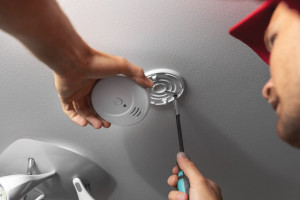Fire Safety Tips for Your Home
Posted on 09/11/2022 12:23 PM | by NaijaHouses

In the event of a house fire, every second counts. A fire can become life-threatening within two minutes, according to the U.S. Department of Homeland Security and a home can become completely engulfed in flames and filled with thick black smoke in five minutes.
“There are nearly 500,000 house fires every year in the United States,” says Mallory Micetich, home care expert at home services company Angi. “House fires are dangerous and destructive, but many of them can be prevented by following home safety recommendations and keeping up with home maintenance.”
Fires are devastating, but most house fires are preventable. Here are common causes of fires and fire safety tips for your home:
- The most common causes of house fires.
- Home fire safety tips.
- Are there more fires around the holidays?
- What you should do during a house fire.
There are a number of ways a fire can start in the home. Some of the most common ways may be very familiar, but others may be a little more difficult to spot. Being aware and identifying potential risks can help lower the chances of a house fire.
According to the National Fire Protection Association, these are the most common causes of fires in the home:
-
Cooking accidents. According to the NFPA, cooking accidents account for nearly 50% of all house fires. Frequently, cooking fires are caused by grease that becomes overheated or when cooking food is left unsupervised. Make sure to thoroughly clean your cookware to prevent the buildup of grease and other debris and never leave the kitchen unattended while cooking with oil.
“If you see a grease fire in your kitchen, do not use water or attempt to transfer the fiery pot or pan anywhere else,” Micetich says. “As soon as you see smoke, turn off the flame and cover the pan with a heavy metal lid. If the pan starts to produce flames, pour a generous amount of baking soda over it.”
-
Portable heaters and space heaters. Portable space heaters are particularly dangerous. The U.S. Consumer Product Safety Commission estimates that space heaters cause 1,700 fires per year, resulting in about 80 deaths and 160 injuries.
Before you use your space heater for the first time, Micetich advises users to read the instructions and follow them closely. Don’t use a space heater that may be too large for the room or area you want to put it in and make sure there are no combustible materials near the unit. “When possible, try to buy an electric space heater from a reputable brand with added safety features like auto-off and tip safety to prevent house fires,” Micetich adds.
- Electrical faults. Most electrical fires are caused by short circuits or loose connections. Micetich says to bring in a pro once a year to inspect your electrical system and to not overburden your system by running multiple appliances at once.
- Appliance malfunctions. The most common cause of house fires from an appliance is a dryer malfunction. Regularly empty the lint trap in your dryer and have an appliance repair expert routinely inspect your units, Micetich says.
- Chimney issues. Chimney fires can quickly spread to other areas of the home. Micetich advises homeowners to never start a fire using gasoline or kerosene, and only fuel your fires with dry wood or dedicated chimney fire starters. “Bring in a chimney pro once a year to inspect and sweep your chimney to get rid of creosote buildup that causes fires,” Micetich adds. According to the Chimney Safety Institute of America, chimney sweeping and inspection cost between $150 and $450, which could potentially save you tens of thousands of dollars in repairs.
- Smoking and candles. Keep open flames away from flammable materials and never leave them unattended.
The NFPA estimates that one home fire-related death occurs every 3 hours and 8 minutes, and the Insurance Information Institute reports the average home insurance house fire claim between 2016 and 2020 was more than $77,000.
Fortunately, there are steps you can take to keep your homes safe.
- Install smoke detectors. Smoke detectors are your first step toward early home fire detection. Install a smoke detector on every level of your home, inside bedrooms and outside sleeping areas. Test alarms every month and replace batteries once per year.
- Install fire extinguishers. Install a fire extinguisher that’s easily visible and accessible on every level of your home. Regularly examine the extinguishers for signs of corrosion, leakage or clogged nozzles.
- Have a fire escape plan. Sit down with your family members and create a fire escape plan. Have at least two unobstructed exits in every room, like a window or door. Make sure to practice your escape plan at least once per year.
Winter is the peak time for fire-related deaths and injuries, and the holidays come with their own set of fire risks. Christmas trees, decorations, cooking and candles are the leading causes of house fires during the holiday season.
“With more cooking and home heating compared to the rest of the year, it leads to increased risk,” Micetich says. “Christmas trees, whether real or artificial, can catch fire when they get too hot. Opt for LED bulbs to decrease the risk of your tree catching on fire. If you have a real tree, water it regularly to keep the needles from drying out.”
The safety of you and your family is your top priority during a house fire. Put your escape plan into action. If you can’t get out right away, cover vents and protect your lungs as much as possible to reduce smoke inhalation.
“Extinguish the fire, if possible, by using a fire extinguisher or smothering a grease fire with a metal lid,” Micetich says. “If you can’t extinguish the fire, shout 'Fire!', immediately vacate your home and call 911 once you’re safely out.”
Sources: Realestate.usnews.com